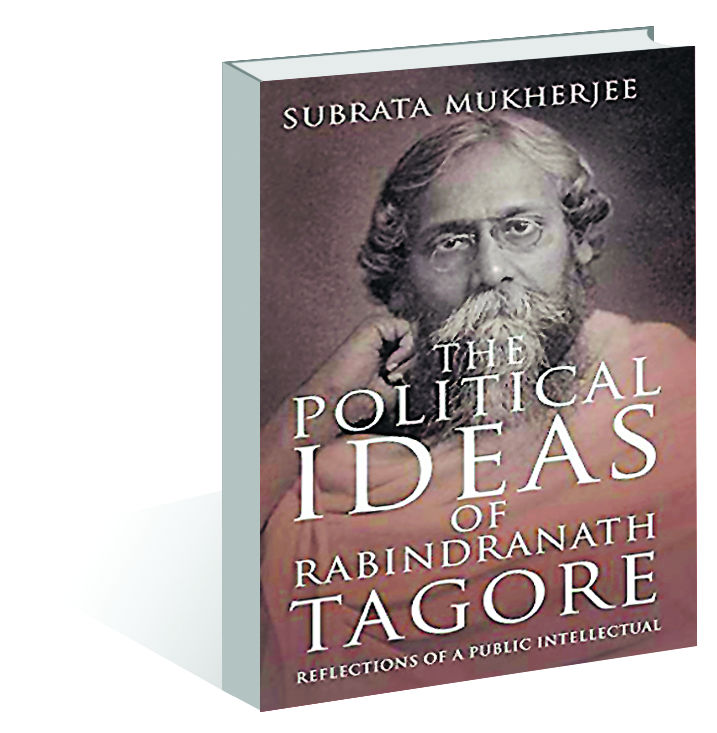The Political Ideas of Rabindranath Tagore: Reflections of A Public Intellectual by Subrata Mukherjee. Rupa. Pages 246. Rs295
Book Title: The Political Ideas of Rabindranath Tagore: Reflections of A Public Intellectual
Author: Subrata Mukherjee
Poonam Datta
Hollywood actor Martin Sheen’s recent recitation of Rabindranath Tagore’s poem, ‘Where the Mind is Without Fear’ once again demonstrates the continuing universal appeal of the poet’s signature composition. Tagore’s vision of transcending time, place, space and national boundary continues to resonate with people’s dreams and hopes all over the world. To read Tagore today, it is also necessary to understand the various national and global events of the late nineteenth and early twentieth century which critically shaped the poet’s language, incorporating distinctive multiple narratives.
Nineteenth-century Bengal witnessed a series of social, literary, political and cultural interventions in the context of the consolidation of the British Empire and its engagement in forging political, social, legal and literary networks with the Indian masses.
Subrata Mukherjee locates Tagore and his outstanding creative world within the national and international milieu of the twentieth-century modern world. The author deftly studies the essays and letters of Tagore to comprehend his political ideas and demonstrates the latter’s unique engagement with fellow Indians, colonists and important political and literary figures of modern times. Tagore’s writings illustrate his compelling views on politics, but he remains essentially a literary figure and not a politician.
Mukherjee sets out to understand and penetrate Tagore’s political philosophy of universalism, humanism and cosmopolitanism, which the poet, to a large extent, inherited from his distinguished family lineage. As Tagore puts it candidly, ‘It was as if we lived close to the age of pre-Puranic India through our commitment to the Upanishads. Along with that, there was a genuinely deep love of English literature among my elders.’
Tagore’s enduring admiration for Upanishads and Vedic literature coexisted with his appreciation of Western scientific inventions, discoveries and rationality and together shaped his extraordinary individualistic opinions, moral stance and non-conformism. However, Tagore’s body of work went beyond the religious identity and sought to reflect humanity, beyond nations and regions, seeking harmony and tranquillity.
The book offers insights into Tagore’s political perspective developed through his interaction with leading personalities and ordinary people in India and abroad. There are several contradictory layers in his political vision. Tagore admired Ram Mohan Roy, but differed from his ideological outlook and disdained Bengali elites for imitating their colonial masters. He disagreed with Bankim Chandra’s ‘aggressive nationalism’. Though he appreciated the Western ideas of scientific progress, he made a trenchant critique of imperialism. He attended meetings of the Indian National Congress (INC), but disapproved of its policies and scorned its leaders for mimicking the West in their language and attire.
As he presided over the Bengal Provincial Congress session in Pabna in 1908, he preferred speaking in Bengali rather than following the convention of addressing in English. In 1904-1905, he joined the Swadeshi Movement as a member of the INC but withdrew from it following sectarian riots. Tagore wrote in Bengali, appreciated local culture, local language and popular and rural artistic forms.
The author argues that Tagore critically addressed the issues of education, rural reconstruction and poverty to awaken the creative and constructive energies of Indians. Though not a socialist, he realised that the real problem in India was social.
Mukherjee brings Tagore to the centre-stage and highlights his debates with Gandhi. The author compares Tagore’s individualistic alternative vision with Gandhi’s idea of non-cooperation and charkha campaign. Tagore argued for the ineffectuality of the practice of charkha for attaining Swaraj. Gandhi’s political and social strategy irked Tagore; he found it to be narrow in the face of refusal to directly engage with the West. He disagreed with Gandhi’s methods to fight imperial forces, though endorsed his commitment to anti-imperialism. For Tagore, as the author shows, political solutions would not inevitably promise ‘personal freedom’ and ‘human enrichment’. He questioned the Western concept of the nation, considered it as a threat to ‘higher humanity’ in disturbing the ‘mingling of the individual with the universe.’
Mukherjee underlines Tagore’s unconventional idea of the nation emphasising the creative energies of the human spirit which were ‘guided by Upanishadic doctrine of Satyam, Sivam and Advitam’ (truth, goodness and unity). He rejected national chauvinism and turned to an eclectic world view reflected in the idea of Visva Bharati, with its Sanskrit motto derived from the Rigveda ‘Yatra Visvam Bhavati Eka Nidam’, meaning ‘the-world-in-one nest’. He was devoted to the spiritual and cultural reconciliation between the races, as embodied in his vision of Visva Bharati at Shantiniketan.
Mukherjee, through a careful and sensitive reading of Tagore’s writings, reveals the hitherto neglected political and literary narratives in forming his cultural creativity and his profoundly transcendental message of the spiritual unity of humankind. This book, written in lucid language and style, is engaging and informative and provides a chronological account of the poet’s extraordinary journey. It is a scholarly reflection on Tagore’s belief in social cohesion and the universal community articulated in his political ideas.














